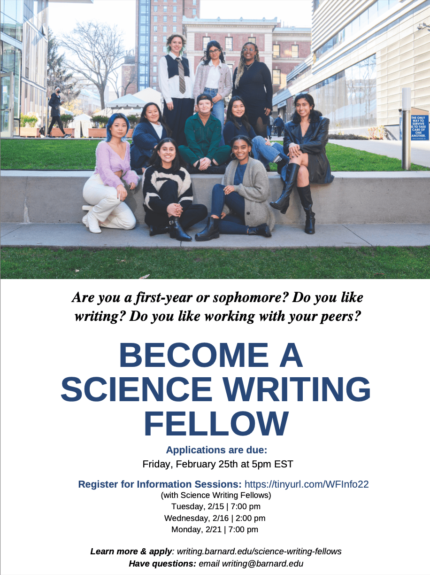Welcome back to Science Fair, Bwog’s weekly roundup of science events happening around campus. As always, email science@bwog.com if you want your event featured.
Student Roundtable Lunch With Minister Catherine McKenna
- Monday, February 14, 2022. 1 pm.
- Open to Columbia UNIs only. Register here.
- Catherine McKenna is Canada’s former Minister of the Environment and Climate Change, and Minister of Infrastructure and Communities. As a member of the Trudeau government, she was a lead negotiator of the Paris Agreement, before introducing and successfully defending landmark legislation that established a carbon price across Canada. Columbia’s Center on Global Energy Policy has invited Columbia students to a student-only lunch with Minister McKenna.
Genomics and Race-Based Medical Guidelines: How Far Have We Come? – Shawneequa Callier
- Monday, February 14, 2022. 12 pm.
- Online event, email alfa.garcia@nyspi.columbia.edu to register.
- In this talk, associate Professor of Clinical Research and Leadership at George Washington University Shawneequa Callier describes the debate on the role of race in medicine and genomics research and current opportunities for courts, lawmakers, and medical societies to move beyond the use of race when describing population differences.
Romantic Autopsy: Literary Form and Medical Reading – Arden Hegele
- Tuesday, February 15, 2022. 6:15 pm.
- Online event, register here.
- Heyman Center of the Humanities show how the arts and sciences intersect in a talk with English and Comparative Literature and Medical Humanities professors from Columbia and Harvard. Professor Hegele will introduce the discussion of how Romantic literature and medicine influenced each other, as poems and novels were historically understood through techniques designed for the analysis of disease while autopsy reports and case histories adopted stylistic features associated with literature.
Decolonise Mosquitoes – Rohan Deb Roy
- Thursday, February 17, 2022. 9:30 am.
- Online event, no registration required. Link here.
- Associate Professor in South Asian History at the University of Reading Rohan Deb Roy rethinks mosquitoes in a decolonial context, focusing on mosquitoes in British India. Professor Deb Roy will introduce three specific historical processes: “invisible labor,” “dissent” and “re-colonization.”
Alternatively, check out the Barnard’s Science Writings Fellows Program
- Applications are due Friday, February 25 at 5 pm.
- Register for an information session here:
- Tuesday, February 15 at 7 pm.
- Wednesday, February 16 at 2 pm.
- Monday, February 21 at 7 pm.

The Science Writing Fellows are a subset of the Writing Fellows program for Fellows with an interest in working with scientific writing. Writing Fellows are generous readers and responsive listeners. We “fellow” written assignments by asking questions so the writer can explain, expand, and explore their writing. One important aspect of being a Writing Fellow is having a desire to connect with peers and to be curious about their work. Writing Fellows are first and foremost advocates for students’ voices. In addition to these attributes, Science Writing Fellows have an academic background in science and desire to support every student in developing their skills at describing and interpreting data, using scientific language clearly and concisely, and blending the skills learned in their humanities classes with their scientific ones. We welcome Barnard first-years and sophomores in all majors to apply. More information here!
an experiment on a bird in the air pump via Wikimedia Commons


 0 Comments
0 Comments